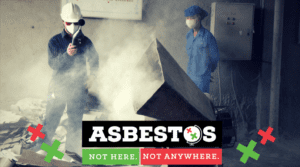Asbestos Campaign: where we are at and where we are heading in 2018
 About 4000 Australians are dying each year from asbestos related cancers, yet while we banned all types of the substance in 2003 in our region it’s a different story. The world still uses about 2 million tons of asbestos every year – and shockingly 75 percent of that consumption in Asia.
About 4000 Australians are dying each year from asbestos related cancers, yet while we banned all types of the substance in 2003 in our region it’s a different story. The world still uses about 2 million tons of asbestos every year – and shockingly 75 percent of that consumption in Asia.
Many governments and consumers in Asia are being misled and lied to by an asbestos industry desperate to protect its last main market region. Latest global estimates of deaths caused by exposure link more than 222,000 deaths in 2016 to asbestos. There is a time bomb of exposure occurring across Asia which will lead to an epidemic of asbestos related cancers in coming decades.
Union Aid Abroad – APHEDA has made ‘Not Here – Not Anywhere’ a key APHEDA campaign priority for the next two years.
Working with trade unions and activist groups, cancer sufferers and their families, and governments at the global, regional, national and local level, the campaign seeks to convince at least three governments to announce bans in the coming two years. The focus is also to reduce the use of asbestos in all countries, campaign to reform the Rotterdam Convention and contribute to keeping asbestos out of Australia.
“We are trying to convince governments in Asia to prevent the future economic, environmental and devastating health impacts of asbestos that Australia is now experiencing, by banning asbestos manufacturing and products as soon as possible” Executive Director Kate Lee said.
With support from trade unions in Australia and donations and time of so many supporters concerned on this issue we are making great progress!!
Vietnam is moving closer to a ban, and ban asbestos groups are emerging across the region
There are clear signs of increased formal and informal prioritisation of the need to ban asbestos within the Asian region as a result of the campaign.
In Vietnam, with the Vietnam Ban Asbestos Network (VN BAN), the campaign has made significant progress with six of seven Government Ministries now agreeing to a ban by 2020. The government also reversed its previous policy and in 2017, supported chrysotile asbestos being listed on Annex III of the Rotterdam Convention. The Ministry of Health completed the National Action Plan to Eliminate Asbestos Related Diseases which included a proposal to ban the substance by 2020.
In Indonesia, our partner organisations, LION and Indonesia Ban Asbestos Network (INABAN), delivered multiple training sessions with factory workers on OHS and also provided training for victims’ groups. Their focus is on organising, movement building and identifying victims with asbestos related diseases and fighting for just compensation. This last year they have successfully won the first occupational compensation case for an asbestos related disease in Indonesia.
In Cambodia, the campaign is supporting 13 ministries, three trade-unions and two employer groups to complete the first national asbestos profile and this year also saw the creation of a local ban network, CamBAN.
In Laos, APHEDA supported research revealed to the government that far from being a low consumer, Laos is the highest consumer of asbestos in the world per head of population! Another milestone was reached this year when our partner the Lao Trade Union (LFTU) led the launching of the LaoBAN network.
The campaign has this year directly trained 1005 construction and health workers, and members of communities living near asbestos factories in Laos, Cambodia and Vietnam.
Significant advocacy, coalition building, awareness raising, research and training has been a feature of our campaign activities. APHEDA has drawn on strong national and international partnerships and together with global ban partners ave brought international experts from Australia, Canada and Japan together on a five country speaking tour of the region meeting Ministers, Ministries, media, trade unions, workers and civil society to push the need for a ban. This program is supported by the Australian Government Asbestos Safety Eradication Agency (ASEA), and the Department of Foreign Affairs and Trade’s Australia NGO Cooperation (ANCP) program, which matches funds we can raise from supporters in Australia.
Our Goals for 2018
The asbestos lobby is spending big to try and stop the ban momentum with ‘safe use’ study tours to Russia, Thailand and Brazil for government officials and leaders. Flashy websites peddling misinformation and industry funded research claiming chrysotile asbestos is not harmful to health also feature in their lobbying activities. Our campaign goals include working with experts globally countering asbestos industry misinformation and propaganda, developing Asia regional ban campaign materials and trainings, and building a global movement with regional and global ban networks, trade unions, researchers and specialists in collaboration with UN agencies, national governments and their agencies, to finally get the job done and achieve a global ban on this deadly fiber.
The Asbestos. Not Here. Not Anywhere. project is supported by the Australian Government through the Australian NGO Cooperation Program (ANCP).